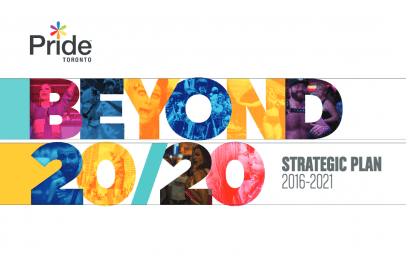Last month amid tepid fanfare, Pride Toronto released Beyond 20/20, a glossy pamphlet, outlining its five-year strategic plan to accomplish . . . you know, on reflection, it’s not at all clear. The document describes the organization’s mission with the deathless sentence: “Pride Toronto brings people together to celebrate the history, courage, diversity and future of our community.”
Let’s leave aside for today’s discussion the fact that Pride Toronto’s mission is now exclusively to “celebrate,” and not to demonstrate, promote or demand rights and equality.
Look at that mission statement again. What “people” is it bringing together? What “community” is it celebrating?
If you didn’t know better, you might assume that Pride Toronto is just a celebration of moments in Toronto’s multicultural history.
Over the last decade, Pride has systematically worked to eliminate signifiers of the LGBT community from its name and branding. The first reasonable steps involved the rebranding of Gay Pride Toronto into a succession of more inclusive names before the organization was simply rebranded as Pride Toronto, with the communities relegated into an increasingly unwieldy acronym appended to description.
Now the acronym — LGBTTIQQ2SA at last count — has been dropped entirely, out of a combination of its inconvenience and because it was somehow not inclusive enough. Pride’s executive director, Mathieu Chantelois, and some of its newly elected board members have all told Daily Xtra that they think dropping references to LGBT people makes the group more inclusive — inclusive of whom, they’re not saying.
Pride Toronto now has the bizarre task of celebrating the courage and diversity of a community it refuses to name.
Pride Toronto isn’t alone in this trend. Capital Pride in Ottawa claims that its mission is to celebrate the “Rainbow Community,” which I’m sure is very exciting to refracted beams of light everywhere in the Capital Region.
That Pride organizations are moving away from naming our communities perhaps isn’t entirely their fault. Calls for new letters to be added to our alphabet soup keep coming all the time from segments of the community that claim that they don’t feel adequately represented by “LGBT,” and the language does tend to shift — even “gay” once referred to people of all genders.
What’s unclear is why, as a community, we’re in such a rush to indulge people who don’t see themselves in us. Let’s be clear: “Lesbian, Gay, Bi, Trans” is a pretty all-encompassing term for members of our community. “Two-spirit” acknowledges the unique form of gender and sexual fluidity in First Nations cultures. Beyond that, what did we need the other letters for anyway?
Allies, sorry, but if you can’t be an ally without taking over our name, you’re being a pretty shitty ally.
Do Transsexuals and Transgender people need separate Ts when their community’s own march includes everyone (including Intersex people) under the umbrella term “Trans?”
And why did we add Queer and Questioning? Questioning isn’t a distinct identity or orientation, and in any event, comes out of the other letters already represented. And Queer is primarily a synonym for the other letters.
The attitude among some community members that the community’s name doesn’t include them isn’t a marker of their unique, snowflake-dom. It’s a manifestation of internalized homophobia and transphobia — and it legitimizes those phobias in others. What is wrong with being identified as gay, lesbian, bi or trans, exactly?
“I may like rubbing my dick against other dicks, but I don’t want to be defined as ‘gay.’” Why? Is there something wrong with being gay?
The millennial trend of shrugging off labels as if they are inherently evil and reductionist overlooks the important power that comes from a shared group identity. A community identity tells us who we are. It bonds us together. It locates us in a community and a history. It presents a united front in the face of those who continue to try to oppress all of us. Yes, they define out some members (non-trans heterosexuals), but that also helps define our causes and our battles.
But then, if our most visible demonstration is only interested in throwing a “celebration,” maybe we have no need for causes and battles.


 Why you can trust Xtra
Why you can trust Xtra


